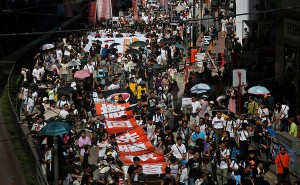How many times have we discussed whether China would be better off with some form of democracy as opposed to its one-party authoritarian system? I know, too many times. But this article on the recent debate between CCP apologist and shill Eric Li and professor of government Minxin Pei is well worth reading. If you don’t believe me about Li being a shill, or if you are unfamiliar with him, read this. This is one of my favorite of Li’s assertions:
China is on a different path. Its leaders are prepared to allow greater popular participation in political decisions if and when it is conducive to economic development and favorable to the country’s national interests, as they have done in the past 10 years.
However, China’s leaders would not hesitate to curtail those freedoms if the conditions and the needs of the nation changed. The 1980s were a time of expanding popular participation in the country’s politics that helped loosen the ideological shackles of the destructive Cultural Revolution. But it went too far and led to a vast rebellion at Tiananmen Square.
That uprising was decisively put down on June 4, 1989. The Chinese nation paid a heavy price for that violent event, but the alternatives would have been far worse.
The resulting stability ushered in a generation of growth and prosperity that propelled China’s economy to its position as the second largest in the world.
For a marvelous take-down of this drivel go here. As if all of China’s great progress rests firmly on the shoulders of the Tiananmen Square massacre.
Anyway, sorry for that digression, but you have to know who Li is to appreciate this debate.
I’ve always been careful to say I don’t believe Western-style democracy would necessarily be the answer to China’s problems of corruption, human rights violations, and the injustices inherent to any one-party system that operates without the checks of rule of law. Pei makes a strong argument, however, that the huge political and economic challenges China is facing are weakening the government and will ultimately result in an “unraveling” of the one-party system. So China should have a democratic infrastructure in place if the party implodes. In a nutshell:
The economy has been driven primarily by investments at home and exports to developed countries, which isn’t sustainable. In the political sphere, we’re seeing manifestations of a fundamental vulnerability of one-party systems globally: a tendency to drift into benefiting a relatively small, and ultimately predatory, elite at the expense of society generally, and the associated phenomena of high-level corruption and inequality.
Together, Pei claimed, these two domains of contradiction tend to impede the growth of China’s economy and undermine the legitimacy of its government. You can see the last two decades as a story of the rise of the Chinese system, Pei said; but the next 10 to 15 years (no less than 10, no more than 15) will be one of the system’s unraveling. And this is what the United States and the West generally need to worry about — not China’s strength but its weakness, because when the transition to a more democratic system comes, it will be very difficult to manage, particularly given the country’s deep ethnic divisions, its disputed borders, and its complex integration with the global economy.
Li’s arguments are familiar: all of China’s mistakes have been dwarfed by its accomplishments, the party has put China on a long trajectory of growth and it would be insane to shift gears when the current system is working, Western democracies are thrown into chaos by politics and therefore can’t get things done, etc. Pei argues that by clinging to an unrepresentative system of government, China may be on a path to collapse should the economy falter dramatically, and having no other alternative to the CCP political bedlam could ensue. A comparison to the collapse of the Soviet Union is not inconceivable.
Li showed his true stripes several times, and he was proud of them. This was one of my favorites:
In response to a question from the audience, Li also criticized the very ideas of political liberty and individual rights. Unless you think rights come from God, he insisted, you really have no theory of why any one view of political liberty any discrete set of individual rights should be sacrosanct at all. “If they’re from men, they’re not absolute; they can be negotiated.” It was only too bad there wasn’t time to discuss what “negotiated” means here.
“I want to break the spell of the so-called right to freedom of speech,” he added later. “Speech is act. It has harmed from time immemorial.”
It’s too bad he sounds like such an apologist. Some of his arguments are fair. We all know how well China has done compared to 30 years ago. I believe the CCP has to be given a lot of credit for improving the quality of the lives of so many of its citizens, and wonder whether its people are ready for pluralism. But who gets to decide that? And if the people so adore the CCP, why do Li and other shills so strongly oppose free elections? And if the government is so confident in China’s future, why are so many party elites moving their assets out of China? Li got kind of tongue-tied over that one.
Anyway, read the whole thing. Nothing new, exactly, but thought provoking. And you really are left wondering what the answer is. Neither Pei’s nor Li’s answers are totally convincing and it’s hard for me to say who “won.”


Comments